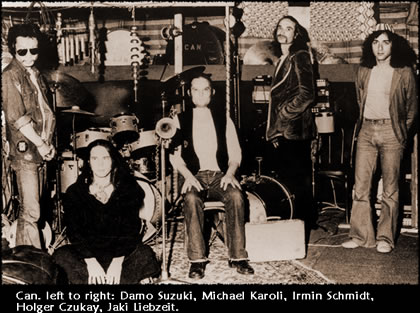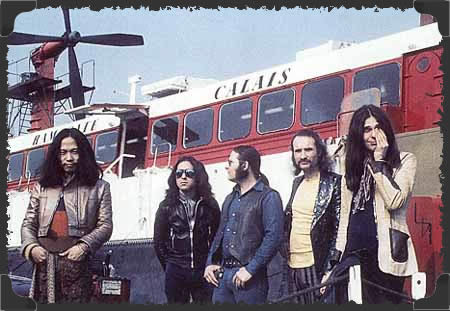

Holger
Czukay and Irmin Schmidt of Can interviewed by Damon Krukowski. None of
these people should need any introduction at all to readers of the
Terrascope, so we’ll dive straight in without further ado - starting with
Damon’s questions to Holger Czukay:
PT: Can had a genius for improvisation, and a genius for editing; how do
these two activities relate?
Holger Czukay: What we did was not improvisation in the classical jazz
sense, but instant composition. Like a football team. You know the goal, but
you don’t know at any moment where the ball is going. Permanent surprise.
Editing, on the other hand, is an act of destroying. And you should not
destroy something if you don’t have a vision to establish it afterwards. If
you have that vision you can go ahead and do that. Can was a band. The
editing had to handled carefully, because it could destroy the character of
the band.
PT: Is it true that there are hundreds of splices in the Can material?
HC: Yes. In my solo works there are sometimes thousands.
PT: Did the recording technology determine Can?
HC: Yes, very much. Not only the machines, but the studio itself. When we
built our studio, we were looking for a studio landscape. The separation of
control room and recording room is necessary only for conventional
recording. You must look for rooms or environments that have a certain
magic, and if they don’t have it, then you build it up. It’s the right
approach for inspired music making.
PT: To me the greatest change in the bands’ records came not with the
change in singers, but with the change to a multi-track machine on ‘Landed’
[1975] and following.
HC: Yes, there is a reason for that. We didn’t even have an engineer.
Everyone was responsible for the mix. And with the multi-track, this sort of
group responsibility was destroyed by the fact that -- of course everyone in
the group gets criticised -- but suddenly one could criticise in such a way
that one could say: it was the guitar. And then the guitar would get
paranoid, and do it again, and everyone else would maybe leave the studio
even, and suddenly this sort of single, out-of-the-group responsibility
happened. This was a big change.
PT: With just the two tracks...
HC: Everyone heard the mix in their headphones, and if one wanted to do
something to change what he played, he would destroy the entire product.
PT: Would you bounce the tracks?
HC: Yes, but we only did overdubs as a group, and only once or twice,
otherwise we were afraid of too much hiss. We were limited to copying it
twice.
PT: Why did Can become a rock band?
HC: By coincidence. None of us were rock oriented. But the only way to
become an entire group with a new sound, was to reduce ourselves. And when
you have a drummer like Jaki Liebezeit, who is more inhuman than a drum
machine... Jaki said we have to reduce ourselves to a minimum, and let
things run by themselves if possible. And he was right. Suddenly we became a
genuine sound.
PT: Did you ever use written music?
HC: No. Written music belongs to the past. It means: there is a creator, and
there is a performer. They are different people. And performers are
organised in unions... Stockhausen is a traditional composer -- innovative,
but a composer nonetheless.
PT: And Cage?
HC: Cage is exactly the opposite. Both worlds are possible and we are
somewhere in between.
PT: Is it true you once turned on all your instruments and left them
alone, to see what they would play?
HC: Yes. In fact the first Can concert with Damo Suzuki, that was how it
started. I found Damo in Munich, on the street. He came up singing and
praying to the sun -- very freaky. I said to Jaki, “This is our new singer.”
I said to Damo, “Who are you? What are you doing tonight?” He had nothing to
do, he was tripping around. “Would you like to sing? We are an experimental
group, we have a concert, and if you would like to sing, please come over.”
And he did. We didn’t have any rehearsal. It started with the instruments
alone, feeding back, and Damo was meditating, and all of a sudden he became
a fighting Samurai. And then a rhythm came up that was so unbelievable, that
the people got aggressive, and they all left.
Another time, I was working with David Sylvain. He came in the studio, and
we were having a chat together, and somewhere lost in the corner is a tone,
maybe from a radio or from an organ, and we became silent, and suddenly
there was this mystery, like a perfume, in this room, this studio. And he
got up immediately, and our first piece was done in one go. I am not a
technocrat.
PT: You believe in something magical?
HC: Yes. Tago Mago is a magical work. Before Jaki came to Can, he was trying
to commit suicide. He was playing with Chet Baker in Barcelona, as a jazz
drummer. Then he went to Ibiza. And south of this island is a rock called
Tago Mago. Mago means magic, and Tago was the name of a magic master who
lived there. And Jaki was on that rock and tried to spring down because he
thought his life didn’t make any sense. I think he is the one who said we
should call it Tago Mago.

PT: Do you write music?
Irmin Schmidt: When I started to make music, I wrote. But for a concept like
Can, you can’t write. This is obvious, because the author is Can. It is
creating on the spot.
PT: You studied with Stockhausen?
IS: Yes, among others. Ligeti was more important to my development at that
time than Stockhausen. Ligeti was a fantastic teacher. Not at all dogmatic.
PT: Was Can a break with those studies?
IS: Yes, it was. I was a conductor at the time: Webern, Schoenberg,
Stockhausen. At the time, there was a ban on improvisation. Boulez had put a
spell on any spontaneity -- there was all this very dogmatic thinking in New
Music. You had to have all this enormous complexity, with no repetition, and
no repetitive rhythms, and use every colour only once... all these rules
that didn’t develop very far because they were more the end of a
development, than the beginning of something. I wanted to go away from this.
I stopped conducting, and dedicated myself totally to Can. It was not that I
was at odds with the music, it was more the environment. I always did like
the music -- some of Stockhausen and Boulez and especially Ligeti.
PT: And Cage?
IS: Cage had an enormous impact. I met Cage when he made his first concert
in Germany ever, in Essen. I was totally amazed, I didn’t know what I should
think. I laughed -- you know, sometimes laughing is a reaction that frees
you. And there was this critic sitting behind me who got angry, and she
said, “If you find this funny, you should leave!” Then after the concert I
went to the dressing room, and this same critic was standing there talking
very seriously to Cage. And when she had finished I said, “Mr. Cage, you
must have seen me laughing down there, but please excuse me, it wasn’t meant
badly, it was just something that came out of my body without my willing
it.” And I explained that this woman standing beside him really felt bad
about it. And then he turned to this woman, he sort of took her in his arms,
and said, “Oh, didn’t you have any fun tonight? I am sorry!”
So I visited him a couple times, and he came and did another concert in
Essen. We had a drink before, and he said “Irmin, you can help me with the
performance tonight. I’ll tell you what to do right before it starts, I
don’t know yet what I want, but keep yourself available.” I told him where
to find me, in the gallery where all the professors were seated. And when
the lights went down, Cage came up to me and said, “Take this chair, and rub
it on the floor as hard as you can.” So I went with this chair through the
rows, and my professors thought I was going mad. I was the only one doing
avant-garde music there, so they already suspected I was mad, but now two of
them sprung up: “Irmin, what are you doing? The music starts at any moment!”
But of course the music had already started -- Cage appeared from the other
side, also with a chair, making the same noise!
And then one of them finally said, “Oh, I think this is Cage!” And they sat
down and stared at us. And the dancers from Merce Cunningham’s company were
there, they were all rolling on the floor... which at that time was not what
people imagined dancing was all about.
PT: So was meeting Cage very liberating for you?
IS: Yes it was. He was the most outstanding figure of this idea: that the
music is something around you, already existing. All you do is focus it. And
this is exactly how Can worked. We came into the studio, or on stage, or
wherever we made music, and it was our environment which created the music;
we were the media to focus it, to put it into existence.
I remember some tracks, like “Future Days,” where we came into the studio
and turned on the instruments, and the guitar was on the floor making a
strange sound on its own. Mickey wouldn’t do anything but let it make its
sound, and maybe move it to another place, where it made another sound.
Slowly everyone played with this sound, came into it, and we all created
from what was around us.
PT: To see what the instruments had to say?
IS: Yes. The piece “Unfinished” was made like this. When we switched on the
organ and the guitar, there was a strange interaction between them. The
organ was really broken, so when you touched one key the whole sound it made
changed. Even if you just approached it, it changed, because the waves
changed. So we thought, maybe we leave them alone for a while, and then come
back.
 PT:
Why was Can a rock band?
PT:
Why was Can a rock band?
IS: We had to be, it was destiny. When we started, we knew we wanted to do
something spontaneous together. And it was necessary for music like this to
make sense to have a rhythm. It was Jaki who created the rhythm. And once
you have a rhythm, it became rock. And then one day, this friend of a
friend, a painter and sculptor who was a friend of the composer Tcherepnin,
we met in Paris, and we said, come visit us in Cologne. This was Malcolm
Mooney. When he showed up, I just said, come with me to the studio, we are
making music there. All of a sudden he took the mike and started singing.
And this was like the ignition -- this gave the last kick toward rock.
Between him and Jaki, who had already started to establish this hypnotic
rhythm, all of a sudden Malcolm directed all this undecided energy in the
group to this rhythm. He focused us all on Jaki’s rhythm. It was clear in
this moment that this is where we had to go.
PT: And you didn’t resist it?
IS: No, not at all, we embraced it! This was ‘Father Cannot Yell’, the first
piece.
PT: I don’t hear jazz in Can. However the concept of group improvisation is
very similar.
IS: Not really. Because we had nothing to start from. No theme, no nothing.
Only the environment, in the sense of Cage that we discussed. And this is
not jazz, this is something totally different...The one thing we had all in
common was listening to ethnic music. When we met we figured out that
everybody had listened to this -- I was into Japanese medieval court music,
Noh theatre music and Bugaku. Jaki was into Arabian music. And Mickey and I
were both big admirers of Balinese music, we were chasing after every tape.
PT: Did the minimalists interest you?
IS: Yes. In 1966 I came to New York for the first time. I was sent by my
professors for a conducting contest. But right at the start, I met Terry
Riley. He had this strange little grotto in the Bowery. We sat there night
after night, and he made me play “de dah de dah de dah de”... me on the
piano and him on the sax. At first I thought this was totally stupid. The
result was that I was thrown out of the contest, because I missed certain
rehearsals. I met Steve Reich, and he was also doing the “de dah de dah
de”... but he was different, he had just finished a tape-loop piece. I was
fascinated.
PT: Did you share Can’s music with these people?
IS: Yes, Terry visited us in the studio. Also I met LaMonte Young, and later
they had a concert in Cologne together with the Indian singer, Pandit Pran
Nath, and they visited us.
PT: Could they appreciate the ways in which Can spoke to what they were
doing?
IS: I don’t know how much they appreciated it, because their approach to
music was totally different. But they are very open-minded people.
PT: Minimalism was another way to reintroduce repetition and rhythm into New
Music, but I think the rhythms never got so interesting in that case...
IS: Basically, you are right, but I would say that with Steve Reich it is
different. I find pieces like ‘Music for 18 Instruments’ absolutely
wonderful, one of the highlights of this century’s music, and I find it
rhythmically enormously interesting. And that is written music, so that
returns to one of your first questions. I have no difficulty with any kind
of production of music, as long as the result is good music.
Written & directed by Damon Krukowski, Produced by Phil McMullen
(c) Ptolemaic Terrascope 1998